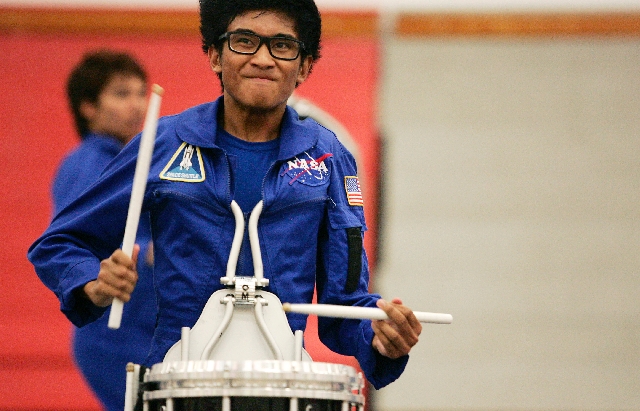Vegas Vanguard Percussion attempts to drum up international win
The campus is quiet, deserted, as you would expect of the University of Nevada, Las Vegas on an eventless Friday evening.
But the open door of one gym invites passers-by to peek in on a puzzling sight.
More than a dozen drummers dart around the basketball court like flies in a jar, their heavy instruments strapped to them. Some have bass drums, others wear snares and a few carry six drums circled around them.
They don’t play in unison like a marching band. The noise builds and narrows to a single beat as the drummers merge into a neat rank-and-file and quiet. A line of students standing behind a bank of vibraphones then chops at cymbals louder and louder until it sounds like rocket fire.
“Back to the top,” Brian Howerton orders from courtside, making everyone repeat the same 10-second snippet for the fifth time while he scrutinizes details like the positions of their thumbs and the spacing between drummers as they dart around.
It has come down to one last weekend rehearsal before Vegas Vanguard Percussion — an underdog, unaffiliated team of students from random valley high schools and colleges — travels to the Percussion World Championships in Dayton, Ohio.
Today marks the finals where, in front of thousands, the team will perform a six-minute routine perfected during 500 hours of rehearsal over six months. That equates to almost 90 minutes spent on each second of their performance.
And it’s for a competition circuit that has been building steam. Last year, it drew 11,000 participants but largely flies under the radar of public awareness. More than 250 teams are expected to compete this year, the largest ever in the championship’s near quarter century.
Each team is allowed to use synthesizers and even video projectors to augment their percussion instruments while performing on a basketball court-sized floor. The rules are few. Just get all the equipment and musicians on and off the stage in nine minutes.
“It’s just drums in a gym. Musical theater meets marching band,” described Brian Howerton, underplaying the split-second precision demanded of his 23 musicians, who must also be actors and athletes, to be competitive.
And competitive they are, taking first in two California competitions and a Southwest regional leading up to this week’s world championships. At international competition, the team has been stuck in third place for the last three years.
‘ASCEND’
Howerton’s new show, “Ascend,” is the most technically challenging of any he has devised in the group’s eight years, he says. It chronicles the tragedy of the 1986 Space Shuttle Challenger explosion, opening with the audio recording of the systems check between Houston and the shuttle before takeoff, which NASA provided to Howerton along with replica astronaut jumpsuits.
“Everyone in the country is looking to knock us off our perch,” Howerton says of the season building to this single six-minute moment.
Jade Schnieder, a rare third-year member, has learned to look forward to that moment.
“It’s a pretty indescribable feeling. You’re finally there,” the Spring Valley High School junior says.
The team has been rehearsing every Friday from 5 to 9 p.m. and Sunday from 9 a.m. to 7 p.m. Drummers must also run miles of sprints and keep up on their core exercises and jumping jacks. Moving a 50-pound drum around stage with speed and grace isn’t easy, says 21-year-old Justin Vaseur during a water break allowing sweaty drummers catch their breath.
Ryan Lindquist, nicknamed Animal after the irreverent drumming Muppet, wishes he could still be darting around stage with his snare. But he’s stuck at the front surrounded by nine cymbals of varying sizes, a huge gong and bass drum. At the world championships two years ago, the 22-year-old discovered he had a congenital heart defect when his aorta almost burst, causing a heart attack feeling. It had gradually been ballooning all his life, but people usually don’t know about it until it bursts, which is why nine out 10 die, he says.
He now has a 10-pound restriction on what he can lift.
“I like that more,” he says, looking longingly at the snare drummers. “I’m just thankful I actually get to perform.”
BUILDING A TEAM
Finding young adults that devoted can be hard, says Howerton who loses half his team every year. There’s also the cost of $1,600 per member, which pays for the instruments, costumes, lodging and travel. But the other coaches and team founder Howerton, a college instructor and formerly a high school teacher of 15 years, are basically unpaid volunteers.
“The fee just gets us there, which sucks because I like to eat,” jokes Howerton, realizing that charging more would lose students. Some teams have nonprofits behind them to provide support, he says.
Howerton started the season with 40 students.
“It slowly dwindled away,” he says, recalling a drummer who dropped out a few weeks from the world championships because his grades were slipping.
Howerton understands. “Look, this is just an activity,” he told the high school senior knowing he’d now have to “scour the earth” for a replacement.
“With drumming, a lot of guys ignore the basics to do the cool stuff,” Howerton says. “And a lot of them don’t want to unlearn to relearn. It’s all about the stick flips.”
But Howerton knew this year was the year to try his challenging show, “Ascend.” Drummers are often swinging around blindly, their drums within inches of each other, while performing complex beats.
“I was waiting for the right group of kids,” he says.
The front ensemble chops at its cymbals to initiate the rocket’s rise, Lindquist bangs on a bass drum. “CBS Evening News” anchor Dan Rather comes over the speakers.
“The Space Shuttle Challenger, apparently moments after takeoff, something went wrong. The vehicle reportedly has exploded,” Rather says.
The percussionists look up in stunned disbelief and fall backward, as if the fiery remains of the shuttle are raining down.
But the show doesn’t end there, says 20-year-old Jordan Mathisen, a music education major manning the synthesizer.
“I kill seven astronauts probably 20 times a rehearsal. Kind of depressing,” he notes.
He later gets to play the speech then President Ronald Reagan gave in the aftermath.
“We will never forget them, nor the last time we saw them, this morning, as they prepared for the journey and waved goodbye and slipped the surly bonds of Earth to touch the face of God.”
Contact reporter Trevon Milliard at
tmilliard@reviewjournal.com or 702-383-0279.

























